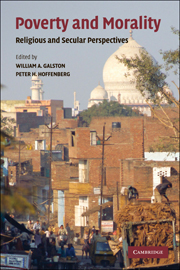Select BibliographyWorld PovertyChambers, Robert.Whose Reality Counts? Putting the First LastLondonIntermediate Technology Publications 1997
Moser, Caroline.Reducing Global Poverty: A Case for Asset AccumulationWashington, DCBrookings Institution 2007
Narayan, DeepaPatel, B.Voices of the Poor: Can Anyone Hear Us?New YorkOxford University Press 2000
Sen, Amartya.Development as FreedomNew YorkOxford University Press 1999
Stewart, FrancesSaith, RuhiHarriss-White, BarbaraDefining Poverty in the Developing WorldNew YorkPalgrave Macmillan 2007
BuddhismBond, George D.Buddhism at WorkSterling, VAKumarian Press 2003
Chambers, Robert.Whose Reality Counts?LondonIntermediate Technology 1997
Loy, David.The Great Awakening: A Buddhist Social TheoryBostonWisdom Publications 2003
Macy, Joana R.Dharma and Development: Religion as Resource in the Sarvodaya Self-Help MovementSterling, VAKumarian Press 1991
Sizemore, Russell F.Swearer, Donald K.Ethics, Wealth and Salvation: A Study in Buddhist Social EthicsColumbiaUniversity of South Carolina Press 1990
ChristianityGroody, DanielThe Option for the Poor in Christian TheologyNotre Dame, INNotre Dame Press 2007
Hoppe, Leslie J.There Shall Be No More Poor among You: Poverty in the BibleNashville, TNAbingdon Press 2004
Pattison, Bonnie L.Poverty in the Theology of John CalvinEugene, ORPickwick Publications 2006
Pixley, Jorge.The Bible, the Church and the PoorMaryknoll, NYOrbis 1989
Van Til, Kent.Less Than $2.00 a Day: A Christian View of Global Poverty and the Free MarketGrand Rapids, MIEerdmans 2007
Classical LiberalismAshton, T. S.The Industrial RevolutionNew YorkOxford University Press 1997
Bastiat, Frederic.Selected Essays on Political Economyde Huszar, George B.Irvington-on-HudsonFoundation for Economic Education 1995
Bauer, Peter.From Subsistence to ExchangePrinceton, NJPrinceton University Press 2000
Beito, David.From Mutual Aid to the Welfare State: Fraternal Societies and Social Services, 1890–1967Chapel HillUniversity of North Carolina Press 2000
Green, David.Working Class Patients and the Medical EstablishmentNew YorkSt. Martin’s Press 1985
ConfucianismBell, Daniel A.Chaibong, HahmConfucianism for the Modern WorldCambridgeCambridge University Press 2003
Fan, Ruiping.Reconstructionist Confucianism and Health Care: An Asian Moral Account of Healthcare Resource AllocationJournal of Medical Philosophy 27 2002 675
Hansen, Chad.Freedom and Moral Responsibility in Confucian EthicsPhilosophy East and West 22 1972 169
Lee, Seung-hwan.Was There a Concept of Rights in Confucian Virtue-Based MoralityJournal of Chinese Philosophy 19 1992 241
Rosemont, Henry, Jr.Human Rights and World ReligionsRouner, Leroy S.Notre Dame, INUniversity of Notre Dame Press 1988
FeminismChant, Sylvia.Gender, Generation and Poverty: Exploring the “Feminisation of Poverty” in Africa, Asia and Latin AmericaNorthampton, MAEdward Elgar 2007
Fuchs, Rachel.Gender and Poverty in Nineteenth-Century EuropeCambridgeCambridge University Press 2005
Hirschmann, Nancy J.The Subject of Liberty: Toward a Feminist Theory of FreedomPrinceton, NJPrinceton University Press 2003
Hirschmann, Nancy J.Ulrike, LiebertWomen and Welfare: Theory and Practice in the United States and EuropeNew Brunswick, NJRutgers University Press 2001
Nussbaum, Martha.Women and Human Development: The Capabilities ApproachCambridgeCambridge University Press 2000
HinduismDas, Gurcharan.India UnboundNew YorkA. A. Knopf 2001
Misra, Vikas.Hinduism and Economic GrowthBombayOxford University Press 1962
Rudolph, Lloyd I.In Pursuit of Laksmi: The Political Economy of the Indian StateChicagoUniversity of Chicago Press 1987
Sharma, Arvind.The Hindu Scriptural Value System and the Economic Development of IndiaNew DelhiHeritage 1980
Sharma, Arvind.The Purusarthas: An Axiological Exploration of HinduismJournal of Religious Ethics 27 1999 223
IslamBonner, MichaelEner, MineSinger, AmyPoverty and Charity in Middle Eastern ContextsAlbanyState University of New York Press 2003
Iqbal, MunawarIslamic Economic Institutions and the Elimination of PovertyLeicester, UKIslamic Foundation 2002
Kuran, Timur.Islam and Mammon: The Economic Predicaments of IslamismPrinceton, NJPrinceton University Press 2004
al-Qardawi, Yusuf.Fiqh az-Zakat: A Comparative StudyKahf, MonzerLondonDar al-Taqwa 1999
ur-Rahman, Afzal.Economic Doctrines of IslamLahoreIslamic Publications 1995
JudaismFlusser, David.Blessed are the Poor in Spirit…Israel Exploration Journal 10 1960 1
Jacobs, Jill.There Shall Be No Needy: Pursuing Social Justice through Jewish Law and TraditionWoodstock, VTJewish Lights 2009
Levine, Aaron.Economic Public Policy and Jewish LawNew YorkYeshiva University Press 1993
Maimonides, Moses.The Code of Maimonides [Mishneh Torah], Book 7: AgricultureKlein, IsaacNew HavenYale University Press 1979
Walzer, MichaelLorberbaum, MenachemZohar, NoamThe Jewish Political Tradition, : CommunityNew HavenYale University Press
Liberal EgalitarianismBeitz, Charles R.Political Theory and International RelationsPrinceton, NJPrinceton University Press 1979
Dworkin, Ronald.Sovereign VirtueCambridge, MAHarvard University Press 2000
Pogge, Thomas.World Poverty and Human RightsLondonPolity Press 2002
Rawls, John.A Theory of JusticeCambridge, MAHarvard University Press 1971
Sen, Amartya.Inequality ReexaminedCambridge, MAHarvard University Press 1992
MarxismCohen, G. A.Karl Marx’s Theory of History: A DefencePrinceton, NJPrinceton University Press 2000
Elster, Jon.An Introduction to Karl MarxCambridgeCambridge University Press 2008
Levine, Andrew.A Future for Marxism?LondonPluto Press 2003
Lukes, Steven.Marxism and MoralityNew YorkOxford University Press 1987
Marx, Karl.Selected WritingsMcClellan, DavidNew YorkOxford University Press 2000
Natural LawCunningham, Lawrence S.Intractable Disputes about the Natural Law: Alasdair MacIntyre and CriticsNotre Dame, INUniversity of Notre Dame Press 2009
Finnis, John.Natural Laws and Natural RightsOxfordClarendon Press 1980
Porter, Jean.Nature as ReasonGrand Rapids, MIEerdmans 2005
Rushton, Roger.Human Rights and the Image of GodLondonSCM 2004
Simon, Yves.The Tradition of Natural LawNew YorkFordham University Press 1992



